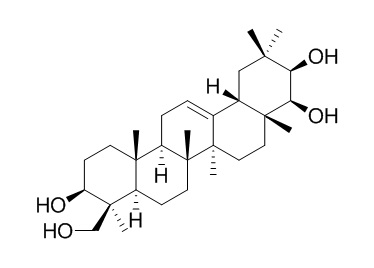Soyasapogenol A
Soyasapogenol A shows estrogenic and hepatoprotective activities, it directly prevents apoptosis of hepatocytes, and secondly, inhibits the elevation of plasma TNF-α, which consequently resulted in the prevention of liver damage in the concanavalin A-induced hepatitis model.
Inquire / Order:
manager@chemfaces.com
Technical Inquiries:
service@chemfaces.com
Tel:
+86-27-84237783
Fax:
+86-27-84254680
Address:
1 Building, No. 83, CheCheng Rd., Wuhan Economic and Technological Development Zone, Wuhan, Hubei 430056, PRC
Providing storage is as stated on the product vial and the vial is kept tightly sealed, the product can be stored for up to
24 months(2-8C).
Wherever possible, you should prepare and use solutions on the same day. However, if you need to make up stock solutions in advance, we recommend that you store the solution as aliquots in tightly sealed vials at -20C. Generally, these will be useable for up to two weeks. Before use, and prior to opening the vial we recommend that you allow your product to equilibrate to room temperature for at least 1 hour.
Need more advice on solubility, usage and handling? Please email to: service@chemfaces.com
The packaging of the product may have turned upside down during transportation, resulting in the natural compounds adhering to the neck or cap of the vial. take the vial out of its packaging and gently shake to let the compounds fall to the bottom of the vial. for liquid products, centrifuge at 200-500 RPM to gather the liquid at the bottom of the vial. try to avoid loss or contamination during handling.
Molecules.2019, 24(6):E1177
Processes 2021, 9(5),894.
J Appl Biol Chem2022, 65:343−348.
Antioxidants (Basel).2022, 11(8):1471.
Universitat Stuttgart2022, opus-12200.
Heliyon.2024, 10(7):e28364.
J. Pharm. Res. Int.2022, 34(58): pp.1-14.
Anat Rec (Hoboken).2021, 304(2):323-332.
Natural Product Communications2020, doi: 10.1177.
Anim Cells Syst (Seoul).2024, 28(1):381-391.
Related and Featured Products
J Agric Food Chem. 2008 Apr 23;56(8):2603-8.
Effect of soyasapogenol A and soyasapogenol B concentrated extracts on HEP-G2 cell proliferation and apoptosis.[Pubmed:
18361499 ]
METHODS AND RESULTS:
The growth inhibition and the induction of apoptosis brought about by soyasaponins extracted from soy flour ( Glycine max (L.)) and concentrated for soyasapogenols A and B formed by hydrolysis were tested for cytoactivity in the human hepatocellular carcinoma cell line Hep-G2. Concentrated Soyasapogenol A (SG-A) and soyasapogenol B (SG-B) extracts contained approximately 69.3% and 46.2% of their respective aglycones (soyasapogenols) assessed by HPLC and ESI-MS, while the soyasaponin extract (TS), derived from crude methanol extraction, did not contain any detectable amounts of SG-A or SG-B. An MTT viability assay showed that all three extracts had an effect on Hep-G2 proliferation in a dose-response manner with 72 h LC50 values of 0.594+/-0.021 mg/mL for TS, 0.052+/-0.011 mg/mL for SG-A, and 0.128+/-0.005 mg/mL for SG-B. Apoptotic cells were determined by flow cytometry cell cycle analysis and confocal laser scanning microscopy (CLSM). Cell cycle analysis indicated a significant ( P< 0.05) greater sub-G1 buildup of apoptotic cells at 24 h (25.63+/-2.1%) and 72 h (47.1+/-3.5%) for the SG-A extract compared to SG-B, whereas the TS extract produced only a minor buildup of sub-G1 cells. CLSM confirmed a morphological change of all treatments after 24 h, at the respective LC50 concentrations.
CONCLUSIONS:
These results show that the samples that contained mainly soyasapogenols A and B showed a greater ability to inhibit proliferation of cultured Hep-G2 when compared to a total soyasaponin extract that did not contain any soyasapogenols.
Eur J Pharmacol. 2000 Mar 10;391(1-2):175-81.
Protective effects of soyasapogenol A on liver injury mediated by immune response in a concanavalin A-induced hepatitis model.[Pubmed:
10720649]
The present study was carried out to analyze the effects of Soyasapogenol A on the liver injury mediated by the immune response in concanavalin A-induced hepatitis in mice.
METHODS AND RESULTS:
Soyasapogenol A reduced the number of infiltrating inflammatory cells in the liver and significantly lowered the elevated level of plasma tumor necrosis factor-alpha (TNF-alpha) 2 h after concanavalin A treatment, and then markedly reduced the elevated plasma alanine aminotransferase activity and decreased the number of apoptotic bodies in the liver parenchymal cells but not in the sinusoidal cells at 24 h.
CONCLUSIONS:
Since the effect of Soyasapogenol A on the elevated plasma TNF-alpha level was not appreciable compared to the preventive effect of Soyasapogenol A on the elevated plasma alanine aminotransferase level, these results suggest that Soyasapogenol A directly prevents apoptosis of hepatocytes, and secondly, inhibits the elevation of plasma TNF-alpha, which consequently resulted in the prevention of liver damage in the concanavalin A-induced hepatitis model.
Food Chem Toxicol. 2002 Dec;40(12):1767-74.
Estrogenic and antiproliferative properties of soy sapogenols in human breast cancer cells in vitro.[Pubmed:
12419690]
Two soy sapogenols, Soyasapogenol A (SA) and soyasapogenol B (SB) were tested for their estrogenic activities in estrogen responsive MCF-7 or estrogen-insensitive MDA-MB-231 (MDA) human breast cancer cells.
CONCLUSIONS:
SB and SA had differential actives on cell proliferation with 10 microM SB being growth inhibitory to MDA cells with no significant effect at any concentration on MCF-7 cells. SA also inhibited MDA cell proliferation at 10 micro, but at this same dose stimulated a 2.5-fold increase in MCF-7 proliferation. SA (0.1-10 microM) induced pS2 mRNA levels and the induction was blocked by co-treatment of cells with the anti-estrogen ICI 182,780. SA also induced the formation of an ER-ERE DNA complex measured by electrophoretic mobility shift assay.
CONCLUSIONS:
In summary, these results show that Soyasapogenol A is estrogenic, whereas soyasapogenol B is growth inhibitory.



